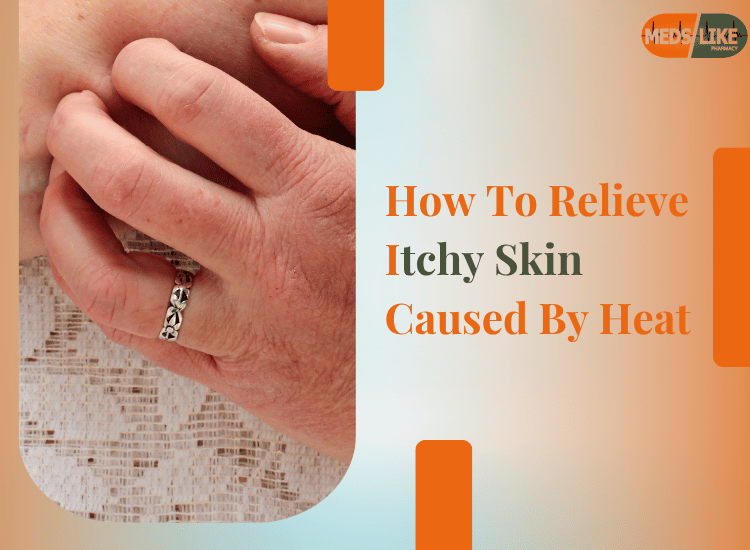Experiencing itchy skin during hot weather is a common yet frustrating condition that can significantly affect your comfort and quality of life. Whether it’s a mild irritation or a persistent itch that worsens with sweating and sun exposure, understanding what causes heat-induced itching and how to manage it can help you stay cool and itch-free during warmer months.
In this blog, we’ll explore the reasons behind itchy skin in hot conditions, identify common symptoms, and provide practical tips and treatments to relieve the discomfort.
What Causes Itchy Skin in Hot Weather?
Several factors contribute to itchy skin when the temperature rises. Here are the most common causes:
1. Heat Rash (Miliaria)
Heat rash occurs when sweat glands become blocked, trapping sweat under the skin. This results in tiny, itchy red bumps that may cause a prickling or stinging sensation. It often appears in areas where sweat accumulates, such as the neck, back, chest, and underarms.
2. Dry Skin (Xerosis)
While we often associate dry skin with winter, summer heat and air conditioning can also strip the skin of its natural moisture. This dryness can lead to flakiness, irritation, and itching.
3. Cholinergic Urticaria (Heat Hives)
This is a type of physical allergy triggered by increased body temperature from heat, exercise, or stress. It typically presents as small, red, itchy bumps that appear suddenly and may last for minutes to a few hours.
4. Sweat Irritation
Sweat itself can be irritating when it mixes with bacteria and salt on the skin. For people with sensitive skin, this can lead to itching, especially in areas where sweat accumulates.
5. Sun Allergy or Photosensitivity
Some individuals experience an allergic skin reaction to sunlight, known as polymorphic light eruption. It can cause redness, itching, and rashes on sun-exposed areas.
Symptoms of Heat-Induced Itching
- Redness or small bumps on the skin
- Burning or prickling sensation
- Intense itching, especially after being in the sun or sweating
- Rash formation in warm, moist areas (under breasts, groin, armpits)
- Skin that feels dry, tight, or flaky
If symptoms persist or worsen, consult a healthcare provider to rule out infections or underlying skin conditions like eczema or psoriasis.
Tips to Relieve Itchy Skin Caused by Heat
Fortunately, there are several effective ways to reduce or eliminate itching caused by heat:
1. Keep Your Skin Cool
Staying cool is key to preventing and relieving itchy skin. Use fans, air conditioning, or cool showers to lower your body temperature. Applying a cold compress or damp cloth to the affected areas can also provide quick relief.
2. Wear Loose, Breathable Clothing
Choose lightweight, loose-fitting clothes made from breathable fabrics like cotton or moisture-wicking materials. Tight clothing can trap sweat and aggravate the skin.
3. Avoid Excessive Sweating
While it’s not always possible to avoid sweating entirely, minimizing intense activity during the hottest parts of the day (usually between 10 a.m. and 4 p.m.) can help. If you need to be outdoors, take frequent breaks in the shade and stay hydrated.
4. Stay Hydrated
Drink plenty of water throughout the day. Hydration helps maintain your skin’s moisture barrier and can prevent dryness and inflammation.
5. Use a Gentle Cleanser
Choose a mild, fragrance-free soap or body wash that won’t strip your skin of natural oils. Avoid hot showers, which can further dry out or irritate your skin. Lukewarm water is best.
6. Moisturize Regularly
After bathing, pat your skin dry and apply a gentle, non-comedogenic moisturizer to lock in moisture. Look for ingredients like aloe vera, ceramides, glycerin, and hyaluronic acid. Avoid lotions with alcohol or strong fragrances.
7. Try Anti-Itch Remedies
Over-the-counter creams containing calamine, menthol, hydrocortisone, or antihistamines can soothe itching. Natural remedies such as aloe vera gel, oatmeal baths, or cold chamomile tea compresses can also help calm the skin.
8. Shower After Sweating
Sweat can irritate your skin if left for too long. Always shower after exercising or being in the heat to remove sweat, bacteria, and other irritants.
9. Avoid Irritants
Be mindful of potential skin irritants such as perfumes, dyes, and harsh laundry detergents. Choose hypoallergenic products designed for sensitive skin.
10. Limit Sun Exposure
Protect your skin from excessive sun by wearing a wide-brimmed hat, using a broad-spectrum sunscreen with SPF 30 or higher, and seeking shade when possible.
When to See a Doctor
If your itchy skin doesn’t improve with home care or is accompanied by symptoms such as:
- Severe rash or blisters
- Fever
- Swelling or pain
- Signs of infection (pus, warmth, red streaks)
…it’s best to consult a healthcare provider. Persistent itching may be a sign of a more serious condition, such as an allergic reaction, fungal infection, or chronic skin disorder.
Preventive Measures for Future Flare-Ups
- Keep your living spaces cool and well-ventilated.
- Use a humidifier indoors if air conditioning dries out your skin.
- Practice good hygiene and change sweaty clothes promptly.
- Apply sunscreen daily to prevent sunburn and heat-related rashes.
- Maintain a skincare routine tailored to your skin type and environmental conditions.
Final Thoughts
Itchy skin caused by heat is a common nuisance, especially during summer or in hot, humid climates. However, with proper skin care, hydration, and heat management, you can prevent and relieve most heat-induced irritation effectively. If symptoms persist despite your efforts, don’t hesitate to seek medical advice to rule out underlying issues.
Take care of your skin—it’s your body’s first line of defense against the elements.

